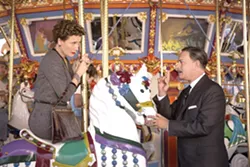Saving Mr. Banks C-
Even with a heaping spoonful of sugar, Disney’s bullshit revisionist fantasy and bald-faced marketing ploy is a bitter pill to choke down.
Did you know that Mary Poppins’ author, P.L. Travers, was a bisexual bohemian actress who hung out with the poet William Butler Yeats and published erotica? You certainly wouldn’t get a whiff of anything near that in Emma Thompson’s prim, humorless portrayal in Saving Mr. Banks.
Here, she’s a clichéd killjoy, the kind of severe and uptight ninny who looks down her upper-crust British nose (even though she’s an Aussie) at American can-do spirit and Hollywood whimsy. It’s a credit to the actress’ formidable talents that she holds our attention for this insulting claptrap.
Gone, too, is any trace of the anti-Semitic, union-busting, HUAC-supporting blemishes on Walt Disney’s record. Instead, Tom Hanks masterfully wields warm smiles and crinkly winks to help burnish the carefully manufactured corporate persona of avuncular Uncle Walt.
This isn’t the corporate tyrant who ruthlessly underpaid his indentured animators, undermined American copyright laws, and couldn’t stand to work with women; it’s Hollywood’s kindly, gee-whiz purveyor of childhood fantasies.
Wouldn’t you know, that silly, spinster fussbudget Ms. Travers won’t let folksy ol’ Walt fulfill the heartfelt promise he made to his daughter 27 years ago to bring Mary Poppins to the screen ⎯ she doesn’t even like animation ⎯ and insists on co-authoring the script. What an uptight bitch!
Not to worry. A magical first-class trip to Los Angeles, a schlumpy salt-of-the-Earth limo driver (Paul Giamatti), a few catchy show tunes by Richard and Robert Sherman (played by Jason Schwartzman and B. J. Novak, respectively) and some Oprah-esque healing will set this ugly and unpleasant Brit on the righteous path to capital enterprise.
Plus, she’s in financially dire straits. If she wants to keep her quaint London row house, she had better get with the program and let her beloved Mary be loved good and proper on the silver screen.
Of course, none of this whitewashing and unabashed mythologizing should be a surprise, given that the Disney Company, in partnership with the BBC (an enterprise that tends to be a little more scrupulous), is behind this lifeless lie of a film.
I didn’t really expect a movie to wade into the complicated and unpleasant personal histories of its real-life players, but, come on, how about just a pinch of reality ⎯ something to make the characters more than just walking, talking clichés?
Walt’s frustrated and less-than-dramatic attempts to woo Travers are offset by ho-hum flashbacks to the author’s childhood in the Australian boonies (clearly shot in California). It’s here we learn that her handsome alcoholic pa (Colin Farrell) taught her the wonders of storytelling, but couldn’t hold down a job.
Eventually, he succumbs to TB (actually, it was influenza) just as her stern but sensible aunt sweeps in to set the family home in order. This supposedly reveals the meaning of the movie’s title (though connecting Farrell’s depressed rogue to David Tomlinson’s prudish banker seems laughably far-fetched), and provides us with a tidy pop psychological explanation for why Travers refused to submit to Walt’s wholesome desires.
Above all else, Saving Mr. Banks suffers the sin of being bland and uninteresting. Without the buoyant musical numbers to lean on, (songs Walt was ready to reassign to Bedknobs and Broomsticks if Travers didn’t cough up the rights), the movie barely rises above a mawkish period cable melodrama.
Director John Lee Hancock (The Blind Side) brings exactly the kind of condescending, nuance-free treatment you’d expect for a who-gives-a-shit myth about the international conglomerate that made it.
Mary Poppins was, as we all know, eventually brought to the screen. It made cash hand-over-fist and earned Disney a bucketful of Oscars. But despite what Saving Mr. Banks would have you believe, Travers hated it and forbade any American from ever adapting any of her books again.
You can argue with her lack of appreciation for the beloved musical’s obvious charms, but you can’t fault her for wanting to keep her creations safe from the merciless maw of corporate America.
Saving Mr. Banks is in theaters now and is rated PG-13 with a running time of 126 minutes.


